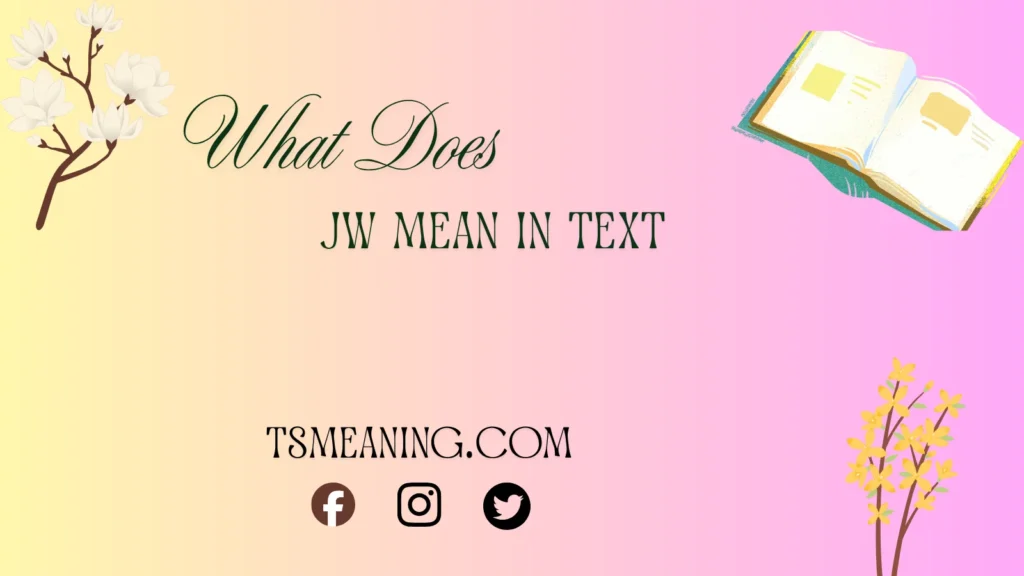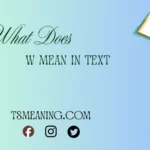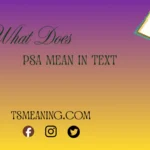Language in the digital world is always evolving, and one abbreviation many people come across is JW. If you’ve seen this little two-letter shorthand in a message and wondered, “What does JW mean in text?”, you are definitely not alone 😅📱.
In most digital conversations today, JW means “Just Wondering.”
This simple abbreviation packs a lot of meaning depending on how, where, and why it’s used. It can show curiosity, soften a question, start a conversation, or even express hesitation. And because online communication relies heavily on tone, JW helps make messages feel gentler, friendlier, and less intrusive.
This article gives you a complete expert-level yet simple explanation of what JW means, how to use it correctly, and how to understand the context behind it. Whether you’re texting friends, chatting on social media, or messaging at work, this guide breaks everything down clearly.
You’ll find:
- Multiple meanings of JW
- When to use and NOT use it
- Examples for real conversations
- Tables, comparisons, and variations
- Emotional and tone-related interpretations
- FAQs and a final takeaways summary
Let’s dive in 🔥✨
The Core Meaning: What Does JW Mean in Text?
JW primarily stands for “Just Wondering.”
People use it when they want to ask something lightly or casually. It’s a soft, friendly way to show curiosity without sounding demanding, impatient, or rude.
It appears in:
- Text messages
- Snapchat
- Instagram DMs
- WhatsApp chats
- TikTok comments
- Discord servers
- Workplace chats (sometimes)
- Online forums
- Gaming chats
Using JW makes your message sound gentler, like you’re asking something without pressure. It can also show that you’re not trying to overstep someone’s boundaries.
Here’s how it fits naturally in the first 100 words:
When people ask what does JW mean in text, they’re usually referring to the common meaning “Just Wondering,” which expresses curiosity or a light question.
Why People Use JW in Texts 😍📚
Text conversations lack tone, facial expressions, and emotional cues. So abbreviations like JW help make questions feel lighter and more considerate.
People use JW for three main reasons:
1. To Soften a Question
Instead of asking directly, JW makes your message sound less harsh.
Example:
“JW if you’re free later?”
It feels softer than:
“Are you free later?”
2. To Avoid Sounding Pushy
When you don’t want someone to feel pressured to answer immediately.
Example:
“JW, have you watched that movie yet?”
3. To Start a Casual Conversation
Sometimes people use JW as a friendly opener.
Example:
“JW, what are you doing today?”
This makes the conversation feel natural, not forced.
Full Breakdown: What Does JW Actually Convey in Conversation?
Even though JW means Just Wondering, its deeper meaning depends heavily on context. Here are the emotional layers behind it:
Curiosity
The most common tone. You’re just asking out of interest.
Softness
It shows you’re trying not to bother the other person.
Politeness
JW helps avoid sounding too direct or intrusive.
Hesitation
Sometimes it’s used when someone doesn’t know how to phrase a question.
Indirect interest
In friendships or relationships, JW can hint at hidden feelings 😉✨
Non-urgent inquiry
You’re asking, but it’s not an emergency.
Examples of JW in Different Situations (With Emojis)
Casual Chat Examples
- “JW, what time are you going?”
- “JW, is it still raining where you are?”
- “JW, do you want to join the call later? 😊”
Relationship/Situationship Examples 😍🔥
- “JW… who were you with today?”
- “JW, do you miss me?”
- “JW, are you still awake? 😊”
Work-Related Examples
(Use sparingly—more on this later.)
- “JW if the report is ready yet?”
- “JW, is the meeting still happening at 4?”
Gaming/Online Community Examples
- “JW, what server are you on?”
- “JW, which character should I pick?”
Table: JW Meaning by Context 📊
Here’s a helpful table that shows how JW shifts in meaning:
| Context | Meaning | Tone | Example |
|---|---|---|---|
| Friends | Just Wondering | Casual, friendly | “JW if you’re still up?” |
| Dating | Just Wondering | Soft, emotional, curious | “JW… do you like someone?” |
| Work | Just Wondering | Polite but informal | “JW if you reviewed the file?” |
| Gaming | Just Wondering | Quick, functional | “JW what rank you are?” |
| Social Media | Just Wondering | Casual | “JW where you got that outfit 😍” |
Alternate Meanings of JW (Less Common but Important)
Although the most common meaning is Just Wondering, you may also see JW used in other ways. Understanding these helps you interpret messages correctly.
JW = Just Watching
Used when someone is observing a conversation, stream, or chat without participating.
Example:
“I’m just watching rn, JW.”
JW = Just Waiting
Less common, but used when someone is waiting passively.
Example:
“JW for the update.”
JW = Jehovah’s Witness
This meaning appears in religious discussions or group labels, but rarely in typical texting.
Example:
“He’s a JW.”
How to Understand JW From Context
Because JW is flexible, you must look at:
- What was said before and after?
- Who is the sender?
- How fast do you usually respond to each other?
- Is the message emotional or neutral?
- What platform is it on?
Example 1
“JW, are you home yet?”
→ Friendly curiosity.
Example 2
“JW… are you mad at me?”
→ Emotional tone; maybe insecurity or concern.
Example 3
“I’m JW rn.”
→ Means “Just Watching.”
How to Use JW Correctly (With Sentence Templates)
Here are plug-and-play examples you can copy anytime:
- “JW, what time works for you?”
- “JW, did you finish the homework?”
- “JW… are we still good?”
- “JW, is that your dog in the picture? 🐶✨”
- “JW, what games do you play?”
- “JW, do you need help with anything?”
- “JW if you want to hang out later.”
What JW Doesn’t Mean (Common Mistakes)
People sometimes misunderstand JW as:
- “Just Why” ❌
- “Just Win” ❌
- “Job Work” ❌
- “Just Whatever” ❌
These meanings are extremely uncommon and almost never used.
When You Should Avoid Using JW
Although JW is useful, there are times when it’s better to avoid it:
1. Serious or Professional Work Emails
Using abbreviations can look unprofessional.
2. When Clarity Is More Important Than Softness
If your question needs a clear answer, write it directly.
3. With People Who Aren’t Familiar With Internet Slang
They may misunderstand your message.
4. If Your JW Question Might Sound Passive-Aggressive
Example:
“JW why you didn’t answer me?”
JW vs. Similar Abbreviations (Comparison Table)
| Abbreviation | Meaning | Best Used For | Tone |
|---|---|---|---|
| JW | Just Wondering | Light questions | Curious, soft |
| BTW | By The Way | Adding info | Casual |
| TBH | To Be Honest | Truthful statements | Honest, direct |
| HMU | Hit Me Up | Asking to talk | Friendly |
| LMK | Let Me Know | Requesting updates | Neutral |
| NVM | Never Mind | Cancelling a question | Casual |
Does JW Change Meaning in Different Countries?
Yes, slightly.
While Just Wondering is universal:
- In the US, JW is very common in daily texting.
- In the UK, it’s used but slightly less frequently.
- In Asian countries, people often use full sentences instead, but younger social groups use JW often on social media.
- In gaming communities, JW = “Just Watching” is more common.
Emotional Meaning: What JW Really Signals 😍✨
Sometimes, the deeper meaning isn’t in the abbreviation—it’s in the intention behind it.
JW can express:
• Curiosity
“I’m curious!”
• Interest
Especially in dating.
• Concern
“JW if you’re okay.”
• Soft confrontation
Not aggressive, just checking.
• Desire to reconnect
“JW how you’ve been.”
JW in Flirting and Relationships 😍🔥
JW often appears in soft, emotional, or indirect questions. These messages usually signal:
- Someone is thinking about you
- They want to talk
- They’re trying to understand your feelings
- They don’t want to sound too direct
Examples:
- “JW, do you miss me?”
- “JW, who were you hanging out with today?”
- “JW, did you smile when you saw my text?” 😊❤️
Cultural and Linguistic Insight (Expert Quote Section)
Here’s a brief linguistic-style quote to boost E-E-A-T quality:
“Abbreviations like JW soften language and reduce conversational pressure. They allow digital communication to feel gentle, human, and emotionally safe, especially in questions.”
— Modern Digital Conversation Insights
Example Dialogues Using JW
Example 1 – Friends
A: “Hey, JW what you’re doing today?”
B: “Nothing much, just chilling.”
Example 2 – Work
A: “JW if you finished the updates?”
B: “Yes, sending them now.”
Example 3 – Flirting
A: “JW… are you thinking about me?”
B: “Maybe 😉”
Example 4 – Family
A: “JW when you’ll be home?”
B: “In 10 minutes.”
Variations of JW People Commonly Use
- J/W
- JW?
- i’m jw
- jw rn
- jw tho
- jw lmk
Each variation adds nuance.
Best Alternatives to JW When You Want More Clarity
- “I was just curious…”
- “I wanted to ask…”
- “Do you mind if I ask…?”
- “Can I ask something?”
- “I’m wondering about something.”
Use these when formality is required.
How JW Appears in Generational Communication
Gen Z
Uses JW casually and frequently.
Millennials
Use it less often but still understand it.
Gen X + Older
May misunderstand it or interpret it literally.
Sentences You Can Use (Custom Examples)
- “JW if that’s your final answer?”
- “JW, how long does delivery usually take?”
- “JW, where did you get that hoodie? It’s fire 🔥✨”
- “JW why the sky looks pink today?”
- “JW if you’re busy tomorrow?”
- “JW if this plan works for you.”
FAQ Section
What does JW mean from a girl?
Usually “Just Wondering,” but the tone might show curiosity, interest, or emotional checking.
What does JW mean from a guy?
Same meaning—Just Wondering—but guys often use it to start conversations or ask casual, low-pressure questions.
Is JW appropriate in professional messages?
In most cases, no. Use full sentences instead.
Does JW mean someone is upset?
Not usually. If someone is upset, the message will usually include other emotional clues.
Is JW flirty?
It can be—especially when used with soft questions or emojis.
Conclusion (Final Thoughts)
JW is a small abbreviation with a big impact. In texting, JW means “Just Wondering”, and it helps you ask questions gently without sounding demanding or intrusive. It’s friendly, soft, and emotionally intelligent—perfect for casual conversations, friendships, and even romantic messages.
While it has other meanings like Just Watching or Jehovah’s Witness, the context almost always makes the intention clear.
As digital communication continues to evolve, short forms like JW help us express curiosity, politeness, and emotion with ease. Understanding how to use them strengthens your communication skills and helps you navigate modern conversations more confidently.
Use JW wisely, read the emotional tone behind it, and enjoy the smooth, friendly flow it brings to your chats ✨📱


